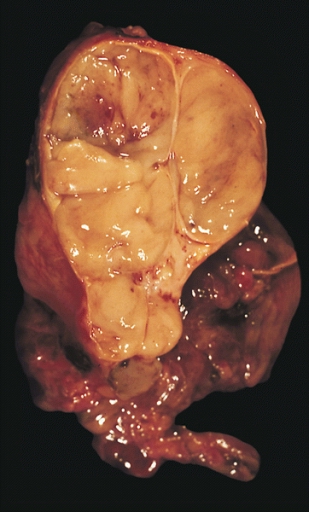Thymoma, Familial

Description
Thymomas are low-grade epithelial cancers of the thymus. Familial occurrence of thymoma is rare.
Clinical FeaturesMatani and Dristsas (1973) reported a Greek sibship of 3, demonstrating familial occurrence of thymoma. One of the 3 sibs, a 2-year-old girl, died of respiratory insufficiency resulting from a lymphocytic thymoma. Her 9-month-old brother died 2 years earlier of the same cause. The eldest sib, a male, and the parents were healthy. No reference was made concerning parental consanguinity. Thymomas are notably rare in persons of this young age.
Wick et al. (1982) described 2 brothers who developed malignant epithelial tumors of the thymus. One had thymic carcinoma with death in his late 50s; the other had an invasive spindle cell thymoma with associated hypogammaglobulinemia. The authors thought the occurrence particularly significant because thymic tumors are rare and malignant forms especially so.
Nicodeme et al. (2005) studied a family bearing the constitutional chromosome translocation t(14;20)(q24;p12). Eleven of 27 family members had the translocation breakpoint; of these 11, 3 had thymoma and 4 others had 5 different autoimmune diseases (109100), namely, diabetes mellitus type I, Graves disease, pernicious anemia, Sjogren disease, and autoimmune pancytopenia. FISH studies demonstrated that the 14q24 breakpoint was in intron 5 of the RAD51L1 gene (602948), and the 20p breakpoint was 100 kb telomeric to the BMP2 gene (112261). RAD51L1 is a tumor-suppressing gene implicated in many tumors (e.g., uterine leiomyomas and pulmonary chondroid hamartomas) and involved in recombinational repair of DNA double-strand breaks. BMP2 belongs to the TGF-beta superfamily and is involved in the maturation of T lymphocytes in the thymic stroma. Dysregulation of RAD51L1 and/or BMP2 was thought to explain the familial occurrence of thymomas and autoimmune diseases.
Population GeneticsNicodeme et al. (2005) stated that familial thymoma has a prevalence of 0.1 to 0.4 per 100,000.
Molecular GeneticsSomatic Mutation
Petrini et al. (2014) analyzed 28 thymic epithelial tumors using next-generation sequencing and identified a missense mutation (chromosome 7 c.74146970 T-A) in the GTF2I gene (601679) at high frequency in type A thymomas, a relatively indolent subtype. In a series of 274 thymic epithelial tumors, Petrini et al. (2014) detected the GTF2I mutation in 82% of type A and 74% of type AB thymomas but rarely in the aggressive subtypes, where recurrent mutations of known cancer genes have been identified. Therefore, GTF2I mutation correlated with better survival. GTF2I beta and delta isoforms were expressed in thymic epithelial tumors, and both mutant isoforms were able to stimulate cell proliferation in vitro. Thymic carcinomas carried a higher number of mutations than thymomas (average of 43.5 and 18.4, respectively).